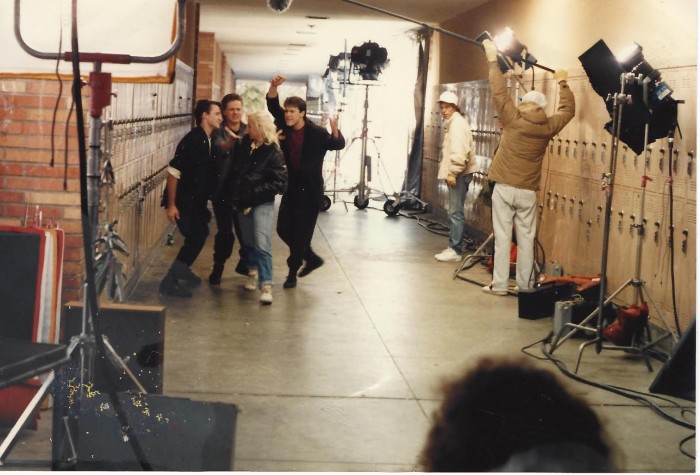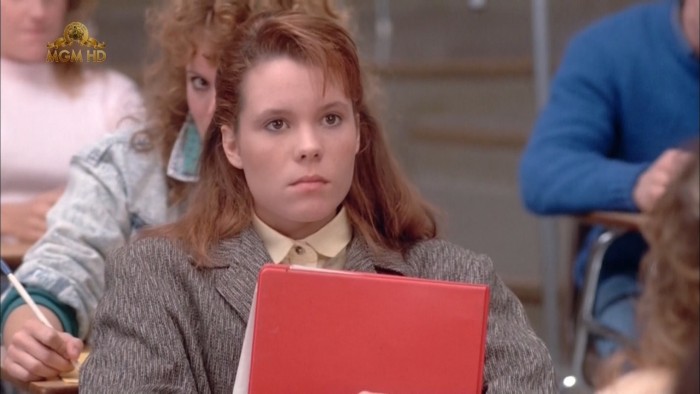How Did This Get Made: Teen Witch [An Oral History]
We may receive a commission on purchases made from links.
Teen Wolf – Wolf + Witch = How Did This Get Made?
Although dueling accounts exist with regards to the origin of Teen Witch, both versions credit their inspiration from the formula above (Teen Wolf – Wolf + Witch). Given its origin, one might expect that Teen Witch would feel dastardly derivative. But no matter how you feel about the movie—some absolutely, overwhelmingly adore it; while others view it as the quintessential '80s bad movie—nobody can deny that Teen Witch feels unique unto itself. It has sincerity, it has heart. And it also has—unlike the original draft of the script—lots of music and dancing. How, exactly, did these ingredients enter the equation? And, one can't help but wonder, does that explanation provide us with clues as to why this movie has aged the way it has?
Teen Witch Oral History
How Did This Get Made is a companion to the podcast How Did This Get Made with Paul Scheer, Jason Mantzoukas and June Diane Raphael which focuses on movies. This regular feature is written by Blake J. Harris, who you might know as the writer of the book Console Wars, soon to be a motion picture produced by Seth Rogen and Evan Goldberg. You can listen to the Teen Witch edition of the HDTGM podcast here. Synopsis: On her 16th birthday, lifelong loser Louise Miller (Robyn Lively) is bestowed with magical abilities, which she the high schooler then uses to try and get what she's always wanted most of all: popularity.Tagline: To Her, Trouble Comes Super-Naturally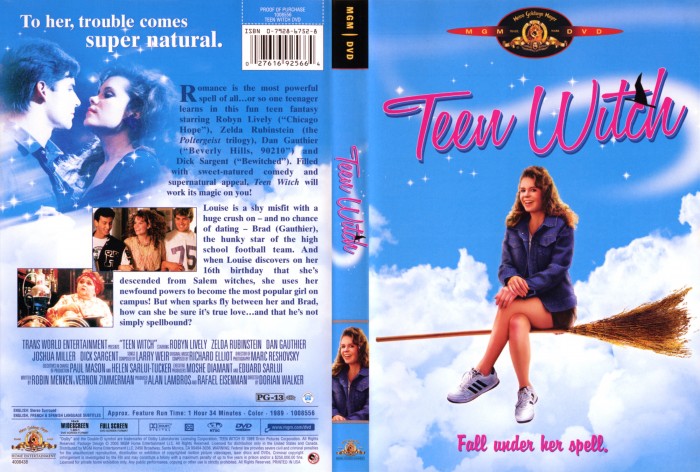
Featuring:
Here's what happened, as told by those who made it happen...
Prologue
Alana H. Lambros: I didn't have money for a location manager, so I dressed up like a teenager and I went to three high schools to try and find a place to shoot our film. I had this big ponytail, no makeup, tennis shoes, and I've got a denim shirt and big denim jacket. On my third high school—because I got so involved in looking at the locations—I ended up being the only "student" left roaming the halls after the bell. So the truant officer comes up to me and asks, "Why aren't you in class?" I quickly turned around and ran out of the school and, if you can believe it, my day only got stranger after that.
CUT TO: One Year Earlier...
Part 1: Bewitched by a Teenage Witch
Robin Menken: Basically, in my era, if you were a woman and you didn't have an alpha male protecting you, you had no chance. Let me give you an example of what it was like. Back in the early '80s, I was writing scripts with Bruce Wagner and Jonathan Kaufman. I was the head writer on this team, but on our office sign my name was always last. I wanted my name first, which is a stupid little thing, but here's the point: One day they call me and they said, "We fixed the sign." So I show up at the office and it says: Robert Menken, Jonathan Kaufman, Bruce Wagner. Robert! So what's what it was like in the '80s for a woman in the town.As difficult as things were for Robin "Robert" Menken, they soon got worse. Robin Menken: I was run over by a car. And Bruce Wagner, who I'd written about nine movies with, we split up. He basically abandoned me. And when I got back into the world, I learned that he was sending out our scripts without my name on them. So I needed another writing partner. I came from Second City and I always wrote with a partner—I thought comedy gestated that way—and I knew Vernon [Zimmerman], so we decided to work together. We developed three stories, three treatments.One of those three was a raunchy teen comedy called Teen Witch. 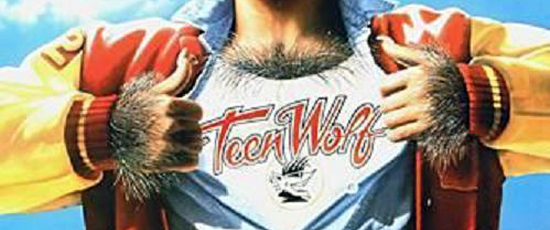 Robin Menken: The way we came up with it was very simple. We were looking at titles for recently successful movies and Teen Wolf had been around, so we said: We got it! We're going to take Samantha from Bewitched and make that a teenage girl's dilemma and show that love is stronger than magic. It was that simple. And then we just spun it out. So we went around pitching Teen Witch and two other storylines. And one of the places we went to was Trans World Entertainment.Paul Mason: I was president of a company called Trans World Entertainment (TWE). The company was owned by an Israeli, Moshe Diamant, and Eduard Sarlui, from Latin America. We made about 10 films a year, all low budget, between $1-3 million in costs. Generally, a "reasonably" known star was attached for foreign sales.Alana H. Lambros: That was the business plan: selling the ancillaries for foreign. And TWE had their own distribution at that time, so all they needed was a movie to go out seven days [in the theater] in order for the video release to work
Robin Menken: The way we came up with it was very simple. We were looking at titles for recently successful movies and Teen Wolf had been around, so we said: We got it! We're going to take Samantha from Bewitched and make that a teenage girl's dilemma and show that love is stronger than magic. It was that simple. And then we just spun it out. So we went around pitching Teen Witch and two other storylines. And one of the places we went to was Trans World Entertainment.Paul Mason: I was president of a company called Trans World Entertainment (TWE). The company was owned by an Israeli, Moshe Diamant, and Eduard Sarlui, from Latin America. We made about 10 films a year, all low budget, between $1-3 million in costs. Generally, a "reasonably" known star was attached for foreign sales.Alana H. Lambros: That was the business plan: selling the ancillaries for foreign. And TWE had their own distribution at that time, so all they needed was a movie to go out seven days [in the theater] in order for the video release to work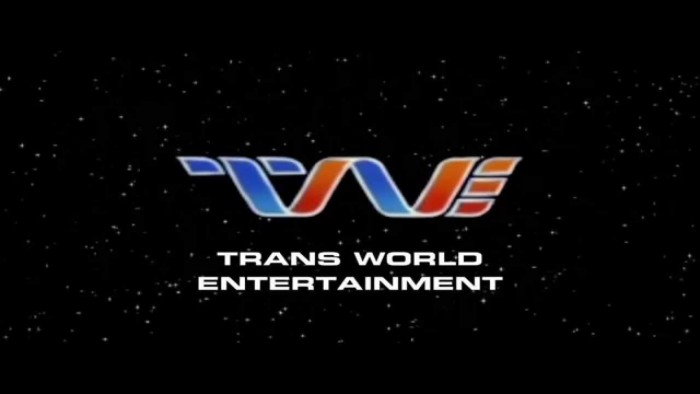 Robin Menken: So anyway, my writing partner, Vernon, and I came up with three storylines and we went around pitching them. And one of the places we went was Trans World Entertainment, where we pitched these three movies. I was always against leaving written treatments or pitches behind, but Vernon wanted to go about it that way. So that's what we did. We left a treatment with this company and about 11 months later they called us up and said, "We have a film we think you'd be perfect for." And they brought us in and pitched us our own movie.TWE's Paul Mason credits a different source of inspiration. Paul Mason: Teen Witch began one morning when Moshe walked into my office and said, "My daughter (who was about 12) says there is a Teen Wolf. So why isn't there a Teen Witch?" I said to Moshe he should buy his daughter an expensive present because she made us all a lot of money. Teen Witch was a great title with a good, predictable story about a teenage girl who suddenly discovers she has witching powers.Robin Menken: Eventually we won this in arbitration with the Writer's Guild. But the point is we took the job because we needed the job and we didn't tell them—at first—that we knew damn well they were pitching us our own treatment. And so then I started working on a script for Teen Witch.Alana H. Lambros: I remember reading it and thinking: Oh my gosh, this could be so good. But the original script was so tacky, and it was a little bit off-color. It definitely wasn't PG-13. Like the girls were in the shower and you kind of saw different areas of them undressing. Dorian Walker: The big thing in the teen genre during the '80s was grossness. You had to have the scene with, say, the lesbian coach. You had to have these elements that spin off that Porky's mentality. So this script, which was written actually by a couple of pretty good writers—Robin Menken and a guy by the name of Vernon Zimmerman—had all those elements. And, at first glance, I just didn't like it. I had no interest in doing a movie with the requisite lesbian coach jokes, you know. But, but, there were two things that led me to take a meeting and ultimately led me to directing Teen Witch. One was that the script and had heart and the other was a little more unusual than that...
Robin Menken: So anyway, my writing partner, Vernon, and I came up with three storylines and we went around pitching them. And one of the places we went was Trans World Entertainment, where we pitched these three movies. I was always against leaving written treatments or pitches behind, but Vernon wanted to go about it that way. So that's what we did. We left a treatment with this company and about 11 months later they called us up and said, "We have a film we think you'd be perfect for." And they brought us in and pitched us our own movie.TWE's Paul Mason credits a different source of inspiration. Paul Mason: Teen Witch began one morning when Moshe walked into my office and said, "My daughter (who was about 12) says there is a Teen Wolf. So why isn't there a Teen Witch?" I said to Moshe he should buy his daughter an expensive present because she made us all a lot of money. Teen Witch was a great title with a good, predictable story about a teenage girl who suddenly discovers she has witching powers.Robin Menken: Eventually we won this in arbitration with the Writer's Guild. But the point is we took the job because we needed the job and we didn't tell them—at first—that we knew damn well they were pitching us our own treatment. And so then I started working on a script for Teen Witch.Alana H. Lambros: I remember reading it and thinking: Oh my gosh, this could be so good. But the original script was so tacky, and it was a little bit off-color. It definitely wasn't PG-13. Like the girls were in the shower and you kind of saw different areas of them undressing. Dorian Walker: The big thing in the teen genre during the '80s was grossness. You had to have the scene with, say, the lesbian coach. You had to have these elements that spin off that Porky's mentality. So this script, which was written actually by a couple of pretty good writers—Robin Menken and a guy by the name of Vernon Zimmerman—had all those elements. And, at first glance, I just didn't like it. I had no interest in doing a movie with the requisite lesbian coach jokes, you know. But, but, there were two things that led me to take a meeting and ultimately led me to directing Teen Witch. One was that the script and had heart and the other was a little more unusual than that...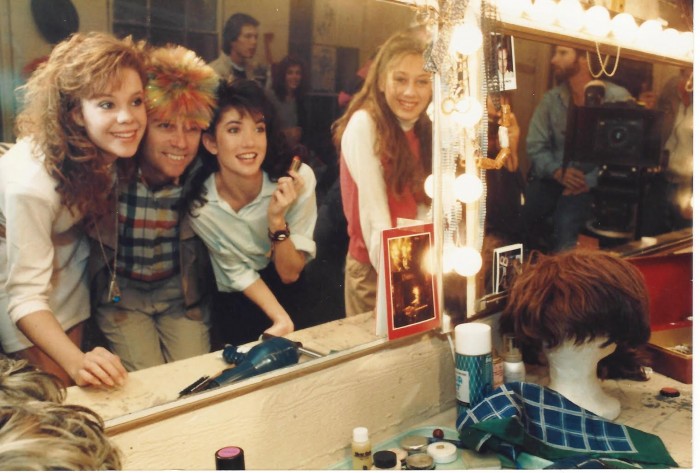
Part 2: Let’s Make a Musical!
Dorian Walker: For whatever reason, this script just literally sang out to me as I was reading it. So I went back and made notes and in the course of the script I found right off the bat about nine places where I thought music could go in there and elevate the core story, and so armed with that I took the meeting with Trans World Entertainment. After we got through the formalities of chitchat, they asked, "So, what do you think about our script?" And I said, "Well, you know, I didn't really care that much about the script. I thought it had a nice storyline, but it had a lot of unnecessary elements." Like what? By this point in my career, I had turned down enough things and I had adjusted to the notion of being quasi-broke pretty well and so I didn't really have anything to lose by sharing what my feelings were. So I mentioned a few of the unnecessary elements—like the lesbian coach, for example—and when I finished speaking, they didn't seem happy. To them, it was like: Then why are we having this meeting? "But," I said, "I see something in this script that I find appealing." And so, after I just told them that their script sucked, I said, "Well, I see this as a musical. As a teen musical." And there was a silence. And then there was a longer silence.Although Walker's words didn't quite resonate with anyone in the room, his vision perfectly coincided with that of another TWE producer: Alana Lambros, who just so happened to be halfway across the world at that time. Alana H. Lambros: I was in Monte Carlo on vacation. And ever since joining TWE, I kept saying that I wanted to do a musical. So finally this project came up and I got a phone call saying, "Alana, forget your trip. Come back to Hollywood, because I think we got the movie that you can produce." So I came back and Moshe, he gives me the script. I wanted to do a quick rewrite and he said, "Okay, you got the weekend." So I took it and I literally tore pages out. Just ripping pages out, I probably took out about 15 pages and I put in blank pages that said "Musical Number." And then Monday morning, I came back to Moshe and said "Okay, I got it." He looks at the script and says, "What are all these blank pages? I paid for a full script!" I said that's where the musical numbers will be. He said, "Okay, you can do this as a musical. But I don't understand this music business, so instead a 30-day shoot, you only have 25 days." And I said, "No problem." And then he said, "You know, I have a million and a half in the budget for this project, but for you it's only $1.25 million." So I said: no problem. Then I turned and I went out the door and I went: How in the heck am I going to do this?Dorian Walker: I didn't hear from them for several weeks, and then I got a call from Alana Lambros. She called me and said, "I'd like to talk to you more about this idea you have about turning this thing into a musical." Sure, so I shared some of my ideas: I see bubblegum rock 'n' roll here. I see this kind of stuff here, and so on.Alana H. Lambros: I think Paul Mason was brilliant in choosing Dorian to direct because he knew he could shoot quickly and he didn't have an ego in looking for that "perfect shot," because we couldn't afford it. We had to do everything in 2-3 takes. Dorian was a great choice.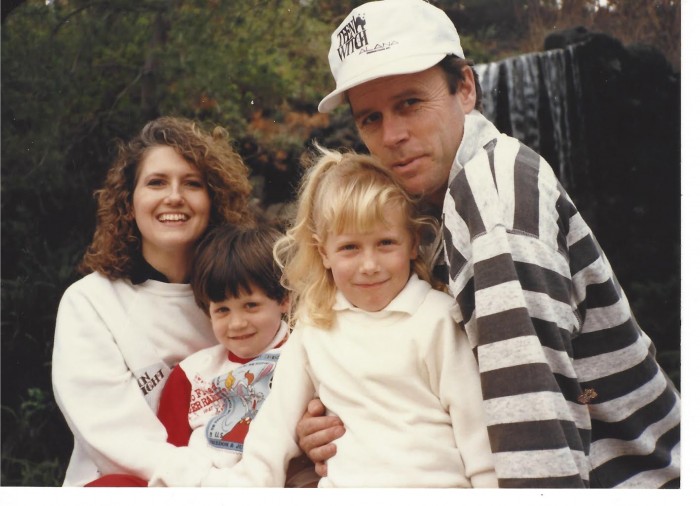 Dorian Walker: Alana and I hit it off. And, unbeknownst to me, I find out two things: One, Alana was a former dancer and she loved music. And number two: Because she was musically inclined, she had relationships with music people in Hollywood. And she had, at that point, a relationship with a pair of brothers called the Weir Brothers.Alana H. Lambros: I hadn't actually met them yet. But I always would meet with agents and say, "Gee, do you have anything exciting?" And there was an agency called APA and I met with the agent Larry Master. He said, "I have a great recording group: the Weir Brothers." He gave me a cassette and I probably got that at the end of the summer. I had it for a long time. I loved the sound, but I wasn't on Teen Witch yet, so I didn't know what to do with it. In my office, I always had an "idea shelf" where I would keep scripts, pictures of talent, or even magazine clippings—things I wanted to draw inspiration from. So the Weir Brothers cassette, I kept there. And then when we started on Teen Witch, I just knew that I already had the perfect music for this film: The Weirz!Larry Weir: I grew up in a very musical family. My mom was a classical pianist and, at one time in the early '80s, the nine of us kids were in a band together. We toured all over military bases from Camp Pendleton to Naval Training Center to Twentynine Palms. We used to travel in a big, giant converted truck and we did this for years. I was the lead guitar player. I was the Elvis. Then my sister right under, Maria, she was the bass player. Then right under Maria was Tom, he was the drummer and he's now a record producer and runs a studio called Studio City Sound in the L.A. area. Estelle, my other sister, played keyboards and did vocals; she's Tom's assistant at Studio City Sound. Pixie (Christine), played trombone and flute and did vocals. And Cathy played trumpet and vocals. And then Teresa, another sister, played saxophone and vocals. And my sister Joanie was the conga player. And then Michael Damian (who would go on to simply use "Michael Damian" as his stage name) was the vibe and trombone player.Not only was Michael Damian the vibe and trombone player, but (years later) he would lead Larry Weir to Teen Witch. Larry Weir: Eventually, I became more of a producer/manager and my little brother, Michael Damian, became one of the stars of The Young and the Restless. I remember one day he came home and said, "They want me to start playing these original songs on the piano." And I go okay, "Let me teach you some." So I started giving him my songs that I was working on and teaching him stuff. Later on, my brother was signed to APA and every Monday I'd go in there and they'd pitch me stuff that he could never do. Because he was on a soap opera almost four days a week. But one day, one of the agents goes, "I know this lady who wants to talk to you about doing music for a movie. Why don't you go down and meet with her?" Yeah, I can do that. So I went down to Trans World Entertainment and met with Alana Lambros, who was putting together this Teen Witch movie. She started explaining the story to me and I was so intrigued. I got so inspired that as she was telling me the story, I actually started writing some of the songs in my head. I think I wrote "Popular Girl" during our discussion.Dorian Walker: So Alana sent me this tape of their music and it was like: My gosh, this would fit right there and this would fit right there. Yeah! This is perfect! These guys were dead-on.Alana H. Lambros: When I hear something or see something, I just know it's right. I have a nose, that's all I can say.Dorian Walker: We were excited to be given this opportunity. Here was a story that we were going to put together and they gave me, as long as I worked within the budget, basically carte blanche. I proceeded forward and hired my own cinematographer. I brought in my own dance guy, Bob Banas, who'd been a dancer in West Side Story. And the casting process was interesting. Originally, at that time, there was a pretty young, well-known singer by the name of Debbie Gibson. And I felt, and Alana felt, that she would be a good choice for this.Alana H. Lambros: We were thinking of that. She was definitely a name that came up. Debbie Gibson was quite popular and TWE wanted name value. We even went to a hotel and actually met with her.Dorian Walker: And there were negotiations, but those talks kind of fell into some challenges.Alana H. Lambros: But it didn't matter anyway, because the actress we cast was perfect. I remember the day when Robyn Lively's 8x10 came to my office and I saw her face. Immediately, I said this is it. She's the girl.Dorian Walker: Robyn ended up doing a really nice job for us.Robyn Lively: I was 15 at the time and it was the lead in a movie, so I was really excited when I got cast. I remember Alana was there and she wanted to know if I could dance, but I'm not much of a dancer—as you can tell in the movie—but that didn't stop me. I just went for it and had a great time.Alana H. Lambros: And Robyn's mother was really sweet. She came to my house because I couldn't even afford a hair dresser in preproduction until the very end, so her mom came to the house and said, "We'll put the extensions in her hair." And I said, "I'm sorry, I have no money for extensions." And I remember Robyn's mom saying, "Don't worry, we'll pay for it."
Dorian Walker: Alana and I hit it off. And, unbeknownst to me, I find out two things: One, Alana was a former dancer and she loved music. And number two: Because she was musically inclined, she had relationships with music people in Hollywood. And she had, at that point, a relationship with a pair of brothers called the Weir Brothers.Alana H. Lambros: I hadn't actually met them yet. But I always would meet with agents and say, "Gee, do you have anything exciting?" And there was an agency called APA and I met with the agent Larry Master. He said, "I have a great recording group: the Weir Brothers." He gave me a cassette and I probably got that at the end of the summer. I had it for a long time. I loved the sound, but I wasn't on Teen Witch yet, so I didn't know what to do with it. In my office, I always had an "idea shelf" where I would keep scripts, pictures of talent, or even magazine clippings—things I wanted to draw inspiration from. So the Weir Brothers cassette, I kept there. And then when we started on Teen Witch, I just knew that I already had the perfect music for this film: The Weirz!Larry Weir: I grew up in a very musical family. My mom was a classical pianist and, at one time in the early '80s, the nine of us kids were in a band together. We toured all over military bases from Camp Pendleton to Naval Training Center to Twentynine Palms. We used to travel in a big, giant converted truck and we did this for years. I was the lead guitar player. I was the Elvis. Then my sister right under, Maria, she was the bass player. Then right under Maria was Tom, he was the drummer and he's now a record producer and runs a studio called Studio City Sound in the L.A. area. Estelle, my other sister, played keyboards and did vocals; she's Tom's assistant at Studio City Sound. Pixie (Christine), played trombone and flute and did vocals. And Cathy played trumpet and vocals. And then Teresa, another sister, played saxophone and vocals. And my sister Joanie was the conga player. And then Michael Damian (who would go on to simply use "Michael Damian" as his stage name) was the vibe and trombone player.Not only was Michael Damian the vibe and trombone player, but (years later) he would lead Larry Weir to Teen Witch. Larry Weir: Eventually, I became more of a producer/manager and my little brother, Michael Damian, became one of the stars of The Young and the Restless. I remember one day he came home and said, "They want me to start playing these original songs on the piano." And I go okay, "Let me teach you some." So I started giving him my songs that I was working on and teaching him stuff. Later on, my brother was signed to APA and every Monday I'd go in there and they'd pitch me stuff that he could never do. Because he was on a soap opera almost four days a week. But one day, one of the agents goes, "I know this lady who wants to talk to you about doing music for a movie. Why don't you go down and meet with her?" Yeah, I can do that. So I went down to Trans World Entertainment and met with Alana Lambros, who was putting together this Teen Witch movie. She started explaining the story to me and I was so intrigued. I got so inspired that as she was telling me the story, I actually started writing some of the songs in my head. I think I wrote "Popular Girl" during our discussion.Dorian Walker: So Alana sent me this tape of their music and it was like: My gosh, this would fit right there and this would fit right there. Yeah! This is perfect! These guys were dead-on.Alana H. Lambros: When I hear something or see something, I just know it's right. I have a nose, that's all I can say.Dorian Walker: We were excited to be given this opportunity. Here was a story that we were going to put together and they gave me, as long as I worked within the budget, basically carte blanche. I proceeded forward and hired my own cinematographer. I brought in my own dance guy, Bob Banas, who'd been a dancer in West Side Story. And the casting process was interesting. Originally, at that time, there was a pretty young, well-known singer by the name of Debbie Gibson. And I felt, and Alana felt, that she would be a good choice for this.Alana H. Lambros: We were thinking of that. She was definitely a name that came up. Debbie Gibson was quite popular and TWE wanted name value. We even went to a hotel and actually met with her.Dorian Walker: And there were negotiations, but those talks kind of fell into some challenges.Alana H. Lambros: But it didn't matter anyway, because the actress we cast was perfect. I remember the day when Robyn Lively's 8x10 came to my office and I saw her face. Immediately, I said this is it. She's the girl.Dorian Walker: Robyn ended up doing a really nice job for us.Robyn Lively: I was 15 at the time and it was the lead in a movie, so I was really excited when I got cast. I remember Alana was there and she wanted to know if I could dance, but I'm not much of a dancer—as you can tell in the movie—but that didn't stop me. I just went for it and had a great time.Alana H. Lambros: And Robyn's mother was really sweet. She came to my house because I couldn't even afford a hair dresser in preproduction until the very end, so her mom came to the house and said, "We'll put the extensions in her hair." And I said, "I'm sorry, I have no money for extensions." And I remember Robyn's mom saying, "Don't worry, we'll pay for it." Dorian Walker: So everything was coming together, though ironically, the only casting that TWE disagreed with was for one of the teachers that we wanted to cast: Ellen DeGeneres. I had seen her at some comedy clubs, we had a reading with her, I said I'd like to cast her, but this one the one place where Moshe stepped in and said no. But I couldn't complain because we got almost everything we wanted. We had a little comedy in the movie, we had a little music and we had a very ambitious shooting schedule.Alana H. Lambros: I got the green light in October [1988], and we planned to start shooting the day after Thanksgiving. So there wasn't a moment to spare!
Dorian Walker: So everything was coming together, though ironically, the only casting that TWE disagreed with was for one of the teachers that we wanted to cast: Ellen DeGeneres. I had seen her at some comedy clubs, we had a reading with her, I said I'd like to cast her, but this one the one place where Moshe stepped in and said no. But I couldn't complain because we got almost everything we wanted. We had a little comedy in the movie, we had a little music and we had a very ambitious shooting schedule.Alana H. Lambros: I got the green light in October [1988], and we planned to start shooting the day after Thanksgiving. So there wasn't a moment to spare!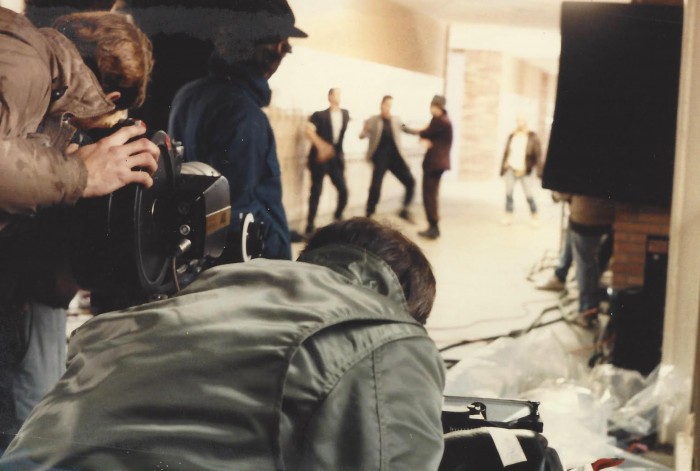
Part 3: Alana Productions Presents
Alana H. Lambros: Making the movie was always magic, it was always magical. But, because of the schedule, the budget and a bunch of other things, there were a lot of problems. For example: At that time, there were a lot of production companies that were trying to pretend that they were non-union because the teamsters were very strict. And so the teamsters shutting down productions left and right. They'd come and close down sets. In fact, I had just done a movie in Seattle with Beau Bridges, which was nonunion, but where the Teamsters found out and they came with the bullhorns and all that. We had to shut down the production, it was horrendous. So I didn't want that to happen again. And one way we thought that could be avoided was if I created my own, separate production company. So Teen Witch was produced by Alana Productions. So all of the contracts, all of the deal memos, it was all under Alana Productions. But now that I'm a company within a company, it was challenging to transfer money quickly. I couldn't pay anybody for at least two weeks. But I'm proud to say that every person that I asked to come on board, they were willing to do it.Dorian Walker: Because we had such an ambitious schedule, choosing the right locations became especially important.Alana H. Lambros: As I mentioned earlier, I couldn't afford a location manager, not at first, so I dressed up like a teenager and visited schools in the area. But what I didn't mention is that on that day I visited the third school, the one I had to run out of, my UPM [unit production manager] had arranged for us to have lunch with the Teamsters. So I'm with this big ponytail, no makeup, and all the rest, and I rush into this Italian restaurant and sit down with the three biggest Teamsters you've ever seen. These guys were huge! And they looked at me like: Little girl, did you lose your mother? Very calmly, my UPM introduces me and then we started a conversation. When I showed them our budget, they were shocked. "Lady," they said, "this isn't even enough money to go on a bus." Yeah, I know. "There's not even enough money in there for our benefits or our union days." Yeah, I know. "But I'll tell you what I do have to offer," I said. "If you allow Teamsters to be on this film, they can be working and be in town for Christmas and New Year's." There was one thing I said to try and convince them: "You know what you guys should do? You should really be supporting the new filmmakers, and the new producers, because we're the ones who are going to be here for the next 10-20 years and make local productions." They were very respectful, they listened to everything I had to say, and then they told me they'd let me know. Well, two days later I get a call saying, "I'm your new captain." Wow. So I had a full Teamster crew that worked nonunion, and they were amazing. They worked so fast and got through red tape like no one's ever gotten through red tape. We were really lucky.Robyn Lively: Everything about the movie felt special. And I was just so happy to have gotten that role. In the '80s, makeover movies were so big. Everybody wanted a role like that—to go from being the nerd to the star—and I got to be the Teen Witch.Alana H. Lambros: Robyn was only 15, which I thought was important for the film. My pet peeve with high school movies is that they always had 29-year-olds playing 16-year-olds. I didn't want us to do that. We were going to have teenagers play teenagers. But this led to another issue that was potentially going to be a big problem with our shooting schedule: Robyn was a minor, which meant that there were a lot of restrictions on how many hours she could film. But once again we got lucky when Robyn's mom said, "Well, we were thinking of emancipating Robyn anyway..."Dan Gauthier: Robyn was seriously young. She was like 15. I was 22, I think. [with sarcastic pride] I was a man!Robyn Lively: Dan was the best. We really were such a tight knit group.Dan Gauthier: It was a very low budget movie so the cast was kind of sequestered into classrooms. Basically, whenever we weren't working on the movie, we were all same room together for long times. We kind of just hung out together and all just BS-ed and talked and got to know each other days at a time. That was really the most impressionable thing for me. We all spent a lot of time together and it was wonderful.Robyn Lively: Oh, and this is the best piece of dirt ever: Dan and Lisa [Fuller, who played "Randa"] ended up getting married shortly after that!Dan Gauthier: Well, all of us were thrust together. A bunch of young people thrust together. We spent a lot of time on the set and she and I happened to be attracted to each other and we started hanging out together. We also played boyfriend and girlfriend in the movie, so we got to spend a little more time together because of that. So we started dating after the movie and after a couple of years we decided to get married.Robyn Lively: Like I said, the whole everything about that movie was just really special. We were just a tight-knit group; one big family. Alana: I loved her so much. Dorian: He was the kindest, warmest, gentlest man. And the Weirs? Those guys and that music? Come on!Larry Weir: We sort of piecemealed the thing together. "I Like Boys" and some of the other stuff we already had in the can. And then I just started carving out stuff for the movie. Little by little, it all started coming together.Alana H. Lambros: Finally, I was able to hire a location manager and we ended up going with a beautiful high school in Glendale.Dorian Walker: One of the reasons I chose that location was because I knew we could point the camera in 4-5 different directions and get a variety of different looks. That way I could maximize the time to focus on the musical scenes. Wanting to prioritize the amount of time for performance. Especially because a lot of the cast didn't have much experience. That location helped us out a lot.Alana H. Lambros: I remember talking to the principal and saying, "Listen, we have no money, but we could work around your Christmas break so that we'd be filming when class wasn't even in session." So we literally used the entire high school around their holiday and they charged us almost nothing. And I even asked the principal if he'd be comfortable putting out an open call for a few days and sure enough, all of the Glendale High School kids showed up when we needed them. I remember being on the playground and looking at Dorian. "We're saved again," I said.Yet despite the multitude of "saves," there were some especially close calls. Three, to be precise...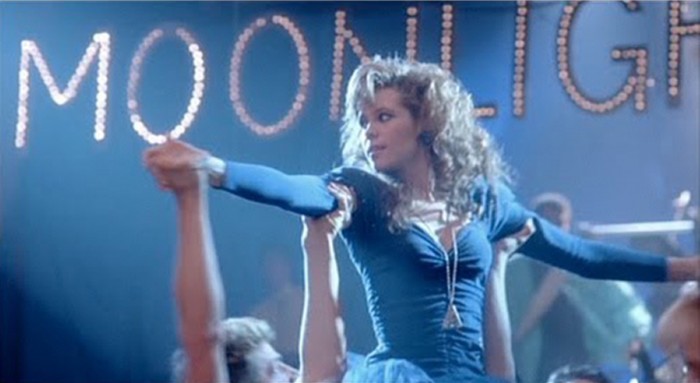 Close Call #1: Pops and the Big DanceAlana H. Lambros: The first hairy incident happened during our big dance number at the gymnasium: "I Like Boys." Since that was our big production number, TWE had arranged for some teen magazines to come on set and do some publicity for the movie. So a few teen magazines came, and while I'm overseeing the production, I look and I can see our sound man, who we used to call "Pops," I could see from a distance that he looked a little piqued. So I just quietly went over to him and said, "Hey, Pops, what's going on?" He wasn't feeling well, but he wanted to keep going. So I kind of put a screen in front of him and sheltered him off, but as soon as I did, he fell to the ground. I called the paramedics and explained the situation. "Please don't put the sirens on, we're filming." So they did and they came really fast. They came and they were very respectful. None of the cast, the crew (or the magazine writers) knew that this was happening. It wasn't until Pops was taken out in a stretcher and put into the ambulance that I told Dorian. Then after the scene, because he's Pops and everybody loved Pops, the girls asked where he was. And when I told them what happened they started crying. But Pops was tough. The next day, he came right back to work. He did have some heart problems, but he said that he'd started this picture and wanted to finish it. "I know your time is short," Pops said. "Besides, nobody is going to take the rate that you're paying!"
Close Call #1: Pops and the Big DanceAlana H. Lambros: The first hairy incident happened during our big dance number at the gymnasium: "I Like Boys." Since that was our big production number, TWE had arranged for some teen magazines to come on set and do some publicity for the movie. So a few teen magazines came, and while I'm overseeing the production, I look and I can see our sound man, who we used to call "Pops," I could see from a distance that he looked a little piqued. So I just quietly went over to him and said, "Hey, Pops, what's going on?" He wasn't feeling well, but he wanted to keep going. So I kind of put a screen in front of him and sheltered him off, but as soon as I did, he fell to the ground. I called the paramedics and explained the situation. "Please don't put the sirens on, we're filming." So they did and they came really fast. They came and they were very respectful. None of the cast, the crew (or the magazine writers) knew that this was happening. It wasn't until Pops was taken out in a stretcher and put into the ambulance that I told Dorian. Then after the scene, because he's Pops and everybody loved Pops, the girls asked where he was. And when I told them what happened they started crying. But Pops was tough. The next day, he came right back to work. He did have some heart problems, but he said that he'd started this picture and wanted to finish it. "I know your time is short," Pops said. "Besides, nobody is going to take the rate that you're paying!"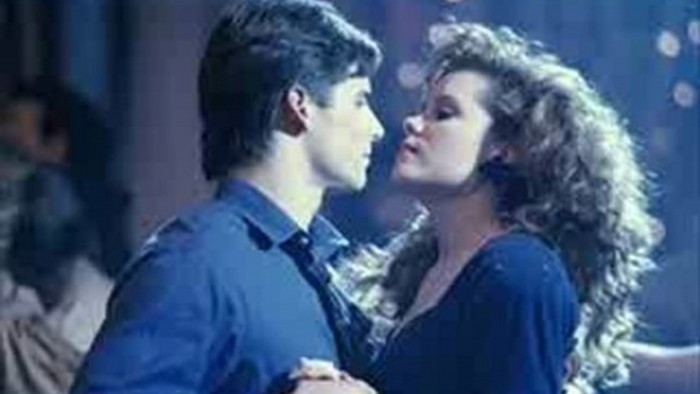 Close Call #2: The Inadvertent Marathon DanceAlana H. Lambros: The second thing happened during the big school dance, when Louise and Brad have their last scene in the movie together. That's probably where all my money for extra casting went. And it was a very, very long night: the longest night we had. It was very intricate. And by midnight, we start slowly losing extras because they just don't want to work anymore. They've already done their 12 hours. Eventually, during a short break, their spokesperson goes up to Dorian and says, "We're going to leave unless you bump our rate right now." Dorian comes up to me and says, "Alana, we gotta bump their rate because they're going to walk out." Of course I wanted to say yes, but we just didn't have the money. So we started out with maybe 75 extras in that scene, by then we were down to 25 and, after the break, only a few stuck around. It was a really tough call, letting them walk, but I felt that if the picture worked, the audience would be so involved with these two people meeting that they're not going to notice that there's not that many people around them. So I took a gamble. But you'll notice it when you see the movie: It kind of looks like a marathon dance where you start with 50 couples and then 36 hours later there's only four couples left.Close Call #3: It's a Wipe!Alana H. Lambros: The third oh-my-gosh-how-are-we-going-to-do-this moment happened during our last, last, scene. It's actually a two-parter. First, Robyn badly hurt her ankle, which was especially a problem because the final scene was supposed to be of her and her dad walking and talking. So Dorian and I got together decided that instead we'll have Louise sitting in her bed, reading a book, and have her dad walk in. If you look, in that final scene, you'll notice that you don't see one of Robyn's feet (because it was pretty swollen). We starting filming the scene and everything seemed to be working out. But then: the second part of the problem. One of my PAs comes to me and says, "Alana, we got a problem." And I said, "Remember, if we have a problem, we gotta have a solution." And he said, "I don't know about a solution, but we got a problem. Our portable potties are overflowing." So I go and you can see this water seeping out and heading towards our electricity and cameras, as we're filming that final scene. To block it off, the whole team of us is putting paper towels in between and trying to prevent the flood from coming. And then I hear the DP shout "It's a wrap," and we cheered so loud. "No," I finally said, "This isn't a wrap. It's a wipe." And I pointed towards all the paper towels that were pushing back the flood of toilet water. So that was kind of an interesting way to end filming. And I remember thinking: Wow, this definitely was a day to not forget so quickly.
Close Call #2: The Inadvertent Marathon DanceAlana H. Lambros: The second thing happened during the big school dance, when Louise and Brad have their last scene in the movie together. That's probably where all my money for extra casting went. And it was a very, very long night: the longest night we had. It was very intricate. And by midnight, we start slowly losing extras because they just don't want to work anymore. They've already done their 12 hours. Eventually, during a short break, their spokesperson goes up to Dorian and says, "We're going to leave unless you bump our rate right now." Dorian comes up to me and says, "Alana, we gotta bump their rate because they're going to walk out." Of course I wanted to say yes, but we just didn't have the money. So we started out with maybe 75 extras in that scene, by then we were down to 25 and, after the break, only a few stuck around. It was a really tough call, letting them walk, but I felt that if the picture worked, the audience would be so involved with these two people meeting that they're not going to notice that there's not that many people around them. So I took a gamble. But you'll notice it when you see the movie: It kind of looks like a marathon dance where you start with 50 couples and then 36 hours later there's only four couples left.Close Call #3: It's a Wipe!Alana H. Lambros: The third oh-my-gosh-how-are-we-going-to-do-this moment happened during our last, last, scene. It's actually a two-parter. First, Robyn badly hurt her ankle, which was especially a problem because the final scene was supposed to be of her and her dad walking and talking. So Dorian and I got together decided that instead we'll have Louise sitting in her bed, reading a book, and have her dad walk in. If you look, in that final scene, you'll notice that you don't see one of Robyn's feet (because it was pretty swollen). We starting filming the scene and everything seemed to be working out. But then: the second part of the problem. One of my PAs comes to me and says, "Alana, we got a problem." And I said, "Remember, if we have a problem, we gotta have a solution." And he said, "I don't know about a solution, but we got a problem. Our portable potties are overflowing." So I go and you can see this water seeping out and heading towards our electricity and cameras, as we're filming that final scene. To block it off, the whole team of us is putting paper towels in between and trying to prevent the flood from coming. And then I hear the DP shout "It's a wrap," and we cheered so loud. "No," I finally said, "This isn't a wrap. It's a wipe." And I pointed towards all the paper towels that were pushing back the flood of toilet water. So that was kind of an interesting way to end filming. And I remember thinking: Wow, this definitely was a day to not forget so quickly.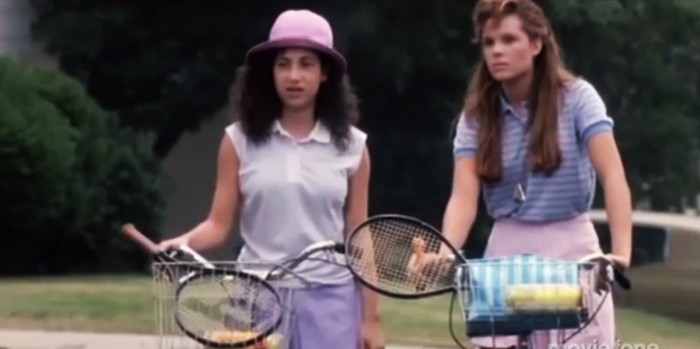
Part 4: In Which Topping That Takes Time
Paul Mason: We finished on time and under budget.Alana H. Lambros: So now we've finished principal photography, we're cutting the film at a lab here in LA. And the people in post, they see everything; and if something looks good, they'll sometimes pass along word to the studios. Projects that are sleepers, with potential, that could maybe use some other money. And the word was out that Teen Witch was very promising and I hear that Disney wants to see the movie.Dorian Walker: But the reaction was so good that TWE decided they wanted to release it themselves.Larry Weir: The movie came out with very little fanfare and then just, like, disappeared. It was very disappointingAlana H. Lambros: I don't know exactly what happened—I was too busy, cutting with Dorian a piece to show at the American Film Market—but nobody at TWE saw the call from Disney wanting to screen the movie and Teen Witch ended up going out on its short run (just the 7 days necessary) and then, by that point, it was already out on the conveyor belt. I can't tell you how much...I just...I don't know.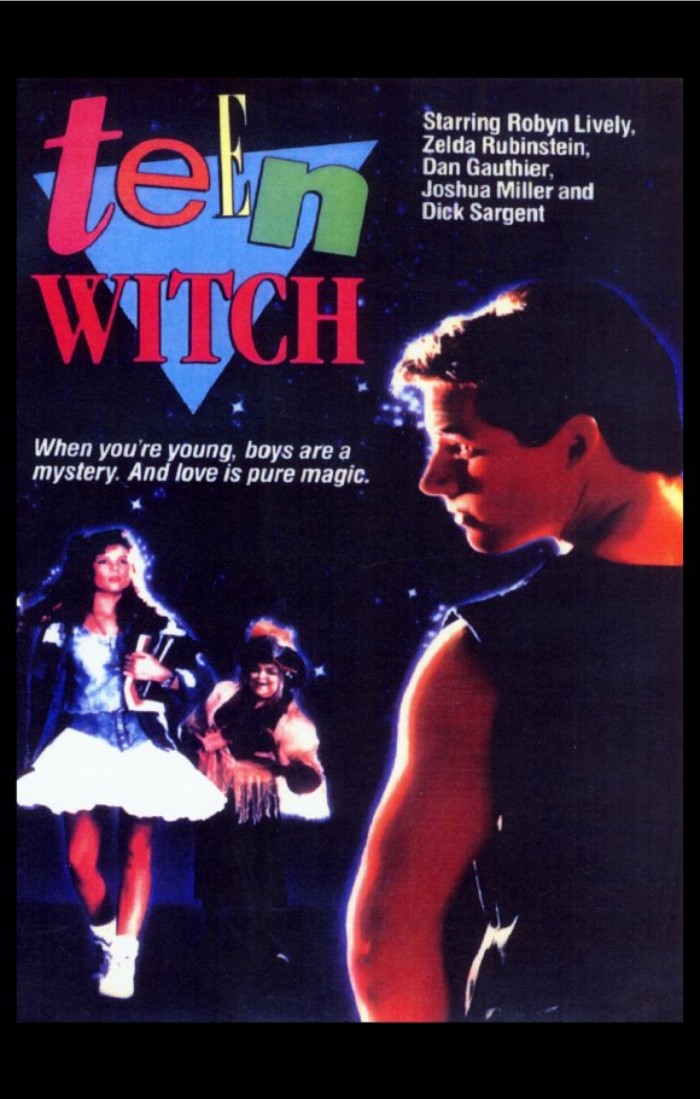 But one thing Lambros and Walker did know was that in order to give the film its greatest chance to succeed (given the theatrical circumstances), they needed to entice buyers at the American Film Market so that it could be sold to distributors around the world. Alana H. Lambros: We had quickly spliced together three dance numbers and plastered the title Teen Witch. During the screening actually, Dorian stayed with the projectors upstairs because he was afraid the film was going to split. And I was downstairs, with the audience, sitting way in the back. All in front of me are all the distributors from Spain, France, Japan, London, everywhere.Paul Mason: It was met with great enthusiasm.Alana H. Lambros: Oh gosh. I knew it was beautiful, but I didn't know if they would all feel the same way.Paul Mason: Film buyers are a tough lot. They see a lot of films and buy about ten percent so their enthusiasm and enjoyment for the picture was very rewarding...[Teen Witch] was met with great enthusiasm and one of the song and dance numbers called "I Like Boys" actually got applause.Alana H. Lambros: So right there, Moshe Diamant comes over and he says, "Alana, is this movie as good as it's getting in applause?" I said, "It's better." I was told they sold all the ancillaries all in one night.Paul Mason: We started receiving very good offers worldwide for the film. So much higher than expected that Moshe got nervous that the buyers might think the film was too cheap and call back their offers. He asked me to add two more scenes with added production value.Alana H. Lambros: But by that time, I had to go onto another project: Cinderella Rock, a full-blown musical that was getting a lot of attention because it had been written by the writer of Rocky Horror Picture Show.Dorian Walker: That was my next project, Cinderella Rock. With Alana. TWE treated me really good after Teen Witch. For the most part, I'm left with only fond memories of that whole period.Paul Mason: I don't remember where Alana was at the time (possibly on another assignment) so we hired Rafael Eisenman, who had produced some small pictures at TWE, to oversee the added shooting.Alana H. Lambros: After that reaction at AFM, Moshe said, "We need to make this picture bigger! We have to put in more music and more scenes!" So that meant more music from the Weirs.Larry Weir: We wrapped one version of the movie and then I got a call from this guy saying, "Alana's no longer with the project, but we know that rap music is popular and we need a rap in this movie. Can you do rap?" Can I do rap? Hey man, yeah I can. So I sat down and they told me about these additional scenes and I remember putting together my song idea for Top That and walking into their office. I had a boom box with me and it was one of the hottest days of the year and I kept remembering that phrase "Never let them see you sweat" while sweat was pouring down my head as I walk into this room with eight executives. All sitting there with their arms crossed. And then I do this rap for them and they have these horrible looks on their faces. There's dead silence and then the head guy goes, "I like it" and then they all go: I like it too! And they all clap.Alana H. Lambros: The film did really well on video and overseas. In the Philippines, for instance, Teen Witch was the highest rated film that year. But that was because they took out our music and they put in the music from Michael Jackson's Thriller soundtrack. But still...Larry Weir: And then one day I got a call from somebody who was asking me about clearing some of the songs for cable and the Disney Channel. Suddenly, it started playing furiously, like almost every week. Kids would come home from school and they'd watch Teen Witch. And all of the sudden this movie went from obscurity to a cult favorite.
But one thing Lambros and Walker did know was that in order to give the film its greatest chance to succeed (given the theatrical circumstances), they needed to entice buyers at the American Film Market so that it could be sold to distributors around the world. Alana H. Lambros: We had quickly spliced together three dance numbers and plastered the title Teen Witch. During the screening actually, Dorian stayed with the projectors upstairs because he was afraid the film was going to split. And I was downstairs, with the audience, sitting way in the back. All in front of me are all the distributors from Spain, France, Japan, London, everywhere.Paul Mason: It was met with great enthusiasm.Alana H. Lambros: Oh gosh. I knew it was beautiful, but I didn't know if they would all feel the same way.Paul Mason: Film buyers are a tough lot. They see a lot of films and buy about ten percent so their enthusiasm and enjoyment for the picture was very rewarding...[Teen Witch] was met with great enthusiasm and one of the song and dance numbers called "I Like Boys" actually got applause.Alana H. Lambros: So right there, Moshe Diamant comes over and he says, "Alana, is this movie as good as it's getting in applause?" I said, "It's better." I was told they sold all the ancillaries all in one night.Paul Mason: We started receiving very good offers worldwide for the film. So much higher than expected that Moshe got nervous that the buyers might think the film was too cheap and call back their offers. He asked me to add two more scenes with added production value.Alana H. Lambros: But by that time, I had to go onto another project: Cinderella Rock, a full-blown musical that was getting a lot of attention because it had been written by the writer of Rocky Horror Picture Show.Dorian Walker: That was my next project, Cinderella Rock. With Alana. TWE treated me really good after Teen Witch. For the most part, I'm left with only fond memories of that whole period.Paul Mason: I don't remember where Alana was at the time (possibly on another assignment) so we hired Rafael Eisenman, who had produced some small pictures at TWE, to oversee the added shooting.Alana H. Lambros: After that reaction at AFM, Moshe said, "We need to make this picture bigger! We have to put in more music and more scenes!" So that meant more music from the Weirs.Larry Weir: We wrapped one version of the movie and then I got a call from this guy saying, "Alana's no longer with the project, but we know that rap music is popular and we need a rap in this movie. Can you do rap?" Can I do rap? Hey man, yeah I can. So I sat down and they told me about these additional scenes and I remember putting together my song idea for Top That and walking into their office. I had a boom box with me and it was one of the hottest days of the year and I kept remembering that phrase "Never let them see you sweat" while sweat was pouring down my head as I walk into this room with eight executives. All sitting there with their arms crossed. And then I do this rap for them and they have these horrible looks on their faces. There's dead silence and then the head guy goes, "I like it" and then they all go: I like it too! And they all clap.Alana H. Lambros: The film did really well on video and overseas. In the Philippines, for instance, Teen Witch was the highest rated film that year. But that was because they took out our music and they put in the music from Michael Jackson's Thriller soundtrack. But still...Larry Weir: And then one day I got a call from somebody who was asking me about clearing some of the songs for cable and the Disney Channel. Suddenly, it started playing furiously, like almost every week. Kids would come home from school and they'd watch Teen Witch. And all of the sudden this movie went from obscurity to a cult favorite.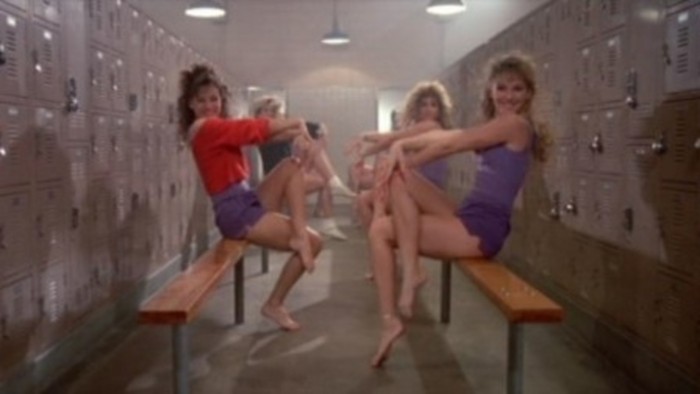
Part 5: The Strange and Beautiful Endurance of Magic (and Movies)
Robyn Lively: I don't think I realized how much some peopled love Teen Witch until I went to Ricki Lake's house. This was years ago, maybe twenty years ago, and I went to her house and she was freaking out. She loved it, she and her gay best friend loved it. They knew all the lines. They knew all the songs. Wow, this is crazy.Dan Gauthier: I don't think any of us would have ever guessed that people would react this way. I mean, I don't think anyone thought we were making Blade Runner. Or Sophie's Choice or something. We all knew what we were doing pretty much, regardless of how naïve we were; but there's no way we could have known it would be, like, a cult hit with people. That they would reference it and know the songs and things like that. I mean, when I meet people who like it, they really like it. If they like it, they're really hardcore about it. It's super cool, you know? Not everybody gets an opportunity to be a part of something like that.Dorian Walker: A movie that has life decades after it was made is due to several things. Luck, for sure; the story, for sure; the team, which you've touched upon very nicely... except that in my opinion, equally important to the story, the approach to telling the story, and the music, was the LOOK! If we hadn't achieved the look, then the rest would be footnotes. To do that I turned to one of my best friends in Hollywood, Bob Richardson. Bob's career was taking off and he was fully committed to other projects, but he knew my sensibilities and how important the look was for me (we had done 3 short films together including my AFI thesis film together) and he made the introduction to Marc Reshovsky, who had done 2nd unit for him on Eight Men Out. Marc had cut his teeth in the burgeoning music video business and was looking to stretch his legs, so we met. We hit it off and I offered him the job. Together, Marc and I created the "look" of Teen Witch that provided a slick, but rich in tone feel that supported the magic that Louise will eventually inhabit. To give you an idea of Marc's talent, when he left Teen Witch he DP'd the Pink Floyd TV special and did the Bon Jovi videos the same year. Sadly, Marc died in 2009, but his contribution still is enjoyed by everyone who over the years has become a fan of the movie called Teen Witch!"Alana H. Lambros: Right from the very start, I knew that I wanted it to be a movie that could pass the different generations. So it would not be a period piece but it could play any time. To help do that, I wanted the clothes not to be those that looked trendy at the time, but I wanted it to be a lot of denim and short skirts. And I asked our makeup artist to go easy on makeup because I wanted everyone to really look like a teenager. I really wanted this movie to last.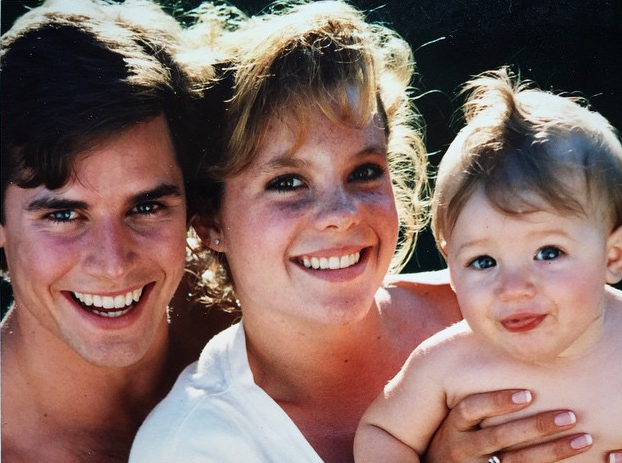 Robyn Lively: I just had no idea that it was going to end up being that kind of movie. Honestly: No...I...dea! And my two younger siblings—Blake and Eric—are obsessed with Teen Witch. Like they're star struck over me being in Teen Witch, that's how much they love it. So for my brother's birthday, this was maybe three years ago, my sister was in town and I said to her, "Oh my god, I have the best idea for what we should do for Eric's birthday. Let's see if we can get Dan over here and we'll recreate a scene. And we'll have Eric come in." So we concocted this genius idea and, mind you, I hadn't really seen Dan in forever. So I text Dan and ask him to do me the biggest favor. He was right in the middle of moving, but he's so sweet and he agreed to do this.Dan Gauthier: Oh, I distinctly remember that. The first thing I texted back to Robyn was: are you sure that's a good idea? I can't remember how old Eric was turning, I think 25 maybe, but I guess her and Blake put this together.Robyn Lively: So Dan comes over to my house and I dress up like the scene where I have him come into the bedroom and I do the spell. He was like: I can't believe you're making me do this. And after I get the video camera, we have my brother Eric—who has no idea what we're up to—dress up like the dad in the movie. We give him a tray of cookies and tell him to walk into the room where we all are. So it's Dan and I—Brad and Louise—sitting on the bed doing the scene and here comes my brother, as Dick Sergeant as the dad, and Blake is holding up cue cards with Eric's line. He was freaking out. Honestly, it was like the best thing ever. Can you imagine?!Dan Gauthier: I hadn't seen Blake or Eric, really, since they were kids. And I hadn't seen Robyn's parents in a long time. And so her parents were there and it was really nice to see them. So it was nice to get together. The whole thing was a bit crazy and silly, but it was all good fun.Larry Weir: But I bet here's one thing you didn't know: I helped Robyn record her own version of "Finest Hour," which she sang as the wedding song for Ryan Reynolds and Blake Lively's wedding.Robyn Lively: It is true. This ties into my siblings loving Teen Witch. So as a surprise for my sister's wedding, my husband and I go into Larry's studio and we re-did "The Finest Hour" song. My husband can actually really sing, so we did the song and recorded it and then, at Blake's wedding, my brother and I re-did that scene. The dance with the arms and the hands. And all of the sudden the music starts and I have my husband and my husband's brother hoist me on their shoulders. And my sister, I thought she was going to die. Honestly, it was so...that was one of the most special moments in my life. It was just the best ever. Ever, ever, ever.Dan Gauthier: It's just one of those things that we all have about movies, which is what's so great about movies, you know? You watch something when you're young and it always kinds of sticks with you and stays with you. Regardless, sometimes, of how good the movie really is. For my wife and I, it's Fast Times at Ridgemont High. Which is actually a really good movie, but at the same time—for us—it wouldn't have really mattered. For us that's a cult classic. For us, that's a movie that reminds us of being young and being in high school. And for some people, Teen Witch is that magical, strange movie that maybe they came across at midnight one night and struck a cord or something. I don't know how exactly it happens, but it's wild.
Robyn Lively: I just had no idea that it was going to end up being that kind of movie. Honestly: No...I...dea! And my two younger siblings—Blake and Eric—are obsessed with Teen Witch. Like they're star struck over me being in Teen Witch, that's how much they love it. So for my brother's birthday, this was maybe three years ago, my sister was in town and I said to her, "Oh my god, I have the best idea for what we should do for Eric's birthday. Let's see if we can get Dan over here and we'll recreate a scene. And we'll have Eric come in." So we concocted this genius idea and, mind you, I hadn't really seen Dan in forever. So I text Dan and ask him to do me the biggest favor. He was right in the middle of moving, but he's so sweet and he agreed to do this.Dan Gauthier: Oh, I distinctly remember that. The first thing I texted back to Robyn was: are you sure that's a good idea? I can't remember how old Eric was turning, I think 25 maybe, but I guess her and Blake put this together.Robyn Lively: So Dan comes over to my house and I dress up like the scene where I have him come into the bedroom and I do the spell. He was like: I can't believe you're making me do this. And after I get the video camera, we have my brother Eric—who has no idea what we're up to—dress up like the dad in the movie. We give him a tray of cookies and tell him to walk into the room where we all are. So it's Dan and I—Brad and Louise—sitting on the bed doing the scene and here comes my brother, as Dick Sergeant as the dad, and Blake is holding up cue cards with Eric's line. He was freaking out. Honestly, it was like the best thing ever. Can you imagine?!Dan Gauthier: I hadn't seen Blake or Eric, really, since they were kids. And I hadn't seen Robyn's parents in a long time. And so her parents were there and it was really nice to see them. So it was nice to get together. The whole thing was a bit crazy and silly, but it was all good fun.Larry Weir: But I bet here's one thing you didn't know: I helped Robyn record her own version of "Finest Hour," which she sang as the wedding song for Ryan Reynolds and Blake Lively's wedding.Robyn Lively: It is true. This ties into my siblings loving Teen Witch. So as a surprise for my sister's wedding, my husband and I go into Larry's studio and we re-did "The Finest Hour" song. My husband can actually really sing, so we did the song and recorded it and then, at Blake's wedding, my brother and I re-did that scene. The dance with the arms and the hands. And all of the sudden the music starts and I have my husband and my husband's brother hoist me on their shoulders. And my sister, I thought she was going to die. Honestly, it was so...that was one of the most special moments in my life. It was just the best ever. Ever, ever, ever.Dan Gauthier: It's just one of those things that we all have about movies, which is what's so great about movies, you know? You watch something when you're young and it always kinds of sticks with you and stays with you. Regardless, sometimes, of how good the movie really is. For my wife and I, it's Fast Times at Ridgemont High. Which is actually a really good movie, but at the same time—for us—it wouldn't have really mattered. For us that's a cult classic. For us, that's a movie that reminds us of being young and being in high school. And for some people, Teen Witch is that magical, strange movie that maybe they came across at midnight one night and struck a cord or something. I don't know how exactly it happens, but it's wild.

